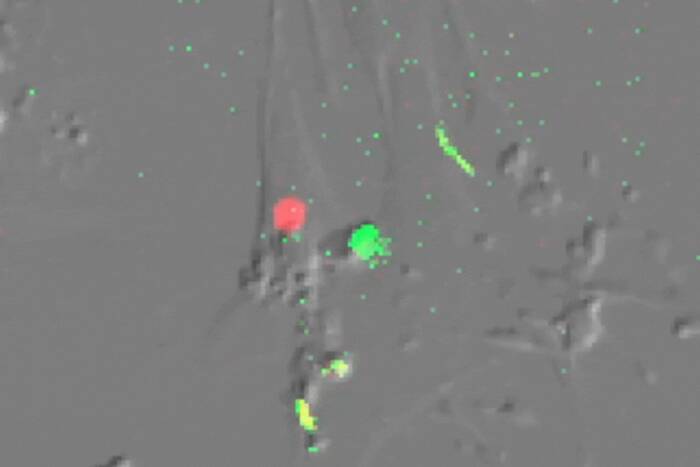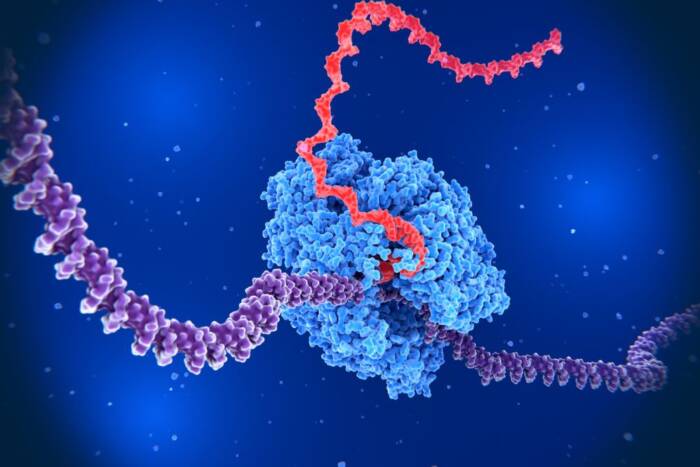First Hepatitis-C Center in Northeast Region Established By Rockefeller University, New York-Presbyterian, and Weill Cornell
Renowned Virologist Charles Rice to Direct Combined Basic Science and Clinical Research Center
New York, NY–Three neighboring New York City medical institutions–The Rockefeller University, NewYork-Presbyterian Hospital, and Weill Medical College of Cornell University–have jointly established the Center for the Study of Hepatitis C, the first major center in the Northeast region devoted specifically to the disease. Renowned virologist Charles M. Rice, Ph.D., who recently made the first infectious clone of the virus, will join The Rockefeller University faculty and serve as both scientific and executive director of the multi-institutional center.
The center’s unique strength will lie in its interdisciplinary approach to investigating the hepatitis C virus (HCV), combining basic research in molecular and cellular biology with clinical studies. The collaborative effort will be driven by leading researchers and clinicians at three prominent institutions, which, as Manhattan neighbors, form one of the world’s great medical complexes. The center will have the ability to investigate both the virus’s basic scientific and clinical manifestations as well as the means to develop potential treatments and offer them to HCV patients.
 Dr. Rice, who will hold the Maurice R. and Corinne P. Greenberg Chair in Virology and serve as Head of the Laboratory for Virology and Infectious Disease at Rockefeller University, will be joined by Ira Jacobson, M.D., an authority on liver disease, who will serve as the center’s first medical director. Dr. Jacobson is professor of clinical medicine at Weill Cornell and chief of the division of gastroenterology and hepatology, and attending physician at the Weill Cornell Medical Center of NewYork-Presbyterian Hospital.
Dr. Rice, who will hold the Maurice R. and Corinne P. Greenberg Chair in Virology and serve as Head of the Laboratory for Virology and Infectious Disease at Rockefeller University, will be joined by Ira Jacobson, M.D., an authority on liver disease, who will serve as the center’s first medical director. Dr. Jacobson is professor of clinical medicine at Weill Cornell and chief of the division of gastroenterology and hepatology, and attending physician at the Weill Cornell Medical Center of NewYork-Presbyterian Hospital.
The Center for the Study of Hepatitis C will be funded by a grant from the Greenberg Medical Research Foundation, which is chaired by Maurice R. Greenberg, chairman and CEO of American International Group, Inc. (AIG). “The current understanding of the Hepatitis C virus is poor,” says Mr. Greenberg. “By bringing together world-renowned scientists, this unique New York City center can improve the lives of millions of infected people through basic research and clinical care.” Mr. Greenberg is former chairman of the board of New York Hospital, chairman emeritus of the NewYork-Presbyterian Hospital, and a trustee of The Rockefeller University.
“The incidence of hepatitis C-associated disease is rising at an alarming rate that is emerging as a serious threat to public health,” says Rockefeller President Arnold J. Levine, Ph.D. “We think a large-scale effort must be implemented now to avoid grave consequences in the 21st century. The Greenberg Foundation’s visionary leadership to fight hepatitis C captures the spirit of philanthropy, which increasingly focuses on the intellectual treasures of New York City — its academic centers.”
Herbert Pardes, M.D., president and CEO of NewYork-Presbyterian Hospital, and Antonio M. Gotto, Jr., M.D., dean of Weill Cornell Medical College, echo Dr. Levine’s enthusiasm for the joint venture. Observes Dr. Pardes: “This is a superb example of the real progress that can be made from a true collaboration among three world-class institutions with the human and material resources to combat the disease at the level of both basic science and clinical treatment. We should do more of this.”
Dr. Gotto adds, “Dr. Rice will be able to rely on all three institutions’ leading researchers and clinicians; count on our outstanding laboratories and patient facilities; and draw on a broad patient base made possible by our joint venture. Our combined basic and clinical research resources will also allow us to work with leading pharmaceutical and biotechnology companies to develop and test effective therapies for HCV.”
Dr. Levine also foresees the center collaborating with private companies to develop and test drugs that will disrupt HCV’s life cycle. “Given the density of population in the New York area, a significant number of hepatitis C carriers live in proximity to one or more of our three institutions,” he says. “This will greatly aid our researchers in recruiting people for various studies, and many patients will welcome the chance to participate in these trials.”
Dr. Levine emphasizes that access to a large and diverse pool of patients will enable scientists to study the natural history of HCV in a significant population. “Development of a patient registry or epidemiology program,” he notes, “will help Dr. Rice and researchers learn the mechanism of chronic infection and whether there is any underlying genetic component that helps some people resist the disease. The diversity of patients will also permit a detailed study of HCV carriers with a variety of symptoms, such as Sjogren’s syndrome, glomerulonephritis, and other autoimmune problems.”
Dr. Jacobson adds, “We are very excited by the arrival of Dr. Rice. His presence, along with that of his co-workers, will provide the scientific foundation for a highly integrated, collaborative effort to address the major issues in this field, including HCV’s natural history, pathogenesis, and therapy. The clinical facility will have expanded capacity for patient care and clinical trials, data storage, and serum and tissue banking.”
The new center also involves several noted physician-scientists at the Columbia Presbyterian Medical Center of NewYork-Presbyterian Hospital and the Columbia University College of Physicians and Surgeons (P&S), including Jean Emond, M.D.,
and Robert Brown, M.D., M.P.H., surgical and medical directors, respectively, of the Center for Liver Transplantation at New York-Presbyterian.
Charles Rice
Charles Rice joins The Rockefeller University from Washington University in St. Louis, where he has been one of the world’s most accomplished virologists and a prominent figure in research on HCV.
“Under the guidance of Dr. Rice, we will start finding answers to the critical questions about HCV,” Dr. Levine says. “We will see progress in developing therapies for hepatitis C only through a basic molecular understanding of the virus’s growth mechanisms and the interplay of its life cycle with physiological and immune factors of the host. It is also clear that there is an urgent need for cell culture and other models in which to study these problems. Dr. Rice will be instrumental in unraveling the mechanisms of HCV and in developing the new models by which to study it.”
“There are many things that led me to make this move,” Dr. Rice says. “I was attracted not only by the reputation of Rockefeller University with its terrific scientists, but also the opportunity to start this special center for hepatitis C research. The basic science will be anchored at Rockefeller, but we will be able to catalyze extensive interactions among physicians and patients at NewYork-Presbyterian Hospital and with researchers at Weill Cornell Medical College.”
Since 1995, Dr. Rice has served as a professor in the department of molecular microbiology at Washington University’s School of Medicine. He first joined the department as an assistant professor in 1986. Rice attended the University of California-Davis as an undergraduate, receiving a BS in zoology in 1974. He went on to do graduate work at the California Institute of Technology, earning a Ph.D. in biochemistry in 1981, and then was a postdoctoral research fellow at the Institute from 1981 to 1985. In 1997, Rice led a research team that demonstrated for the first time that HCV alone is sufficient to cause the disease, a revelation that should help scientists determine the best strategy for developing an effective vaccine.
“The appointment of Dr. Rice as professor re-establishes Rockefeller’s preeminence in the field of virology,” Dr. Levine adds. “While his leadership at the hepatitis center will benefit the entire New York area and the field of hepatitis research, his presence on the Rockefeller campus and interaction with other Rockefeller scientists will lend itself to innovative approaches to fighting many viruses.”
Rice’s study of the virus will greatly benefit, in turn, from collaboration with Rockefeller colleagues working in areas outside virology. For example, Rockefeller scientists adept in X-ray crystallography and other structural biology techniques will help determine the structure of the virus’s proteins, which will aid in designing a drug that could hinder their normal function. Other researchers specializing in replication will shed light on how the virus makes copies of itself. And, given the similarities between HCV and the human immunodeficiency virus (HIV), work done by Rockefeller Professor David D. Ho, M.D., the noted AIDS researcher and scientific director of the Aaron Diamond AIDS Research Center, should increase understanding of hepatitis C and suggest effective ways to fight or prevent it. Ho helped to develop the so-called AIDS cocktail of therapeutic drugs through studies done at The Rockefeller University Hospital.
The Hepatitis C Virus
Some four million people in the United States are infected with HCV, and about 30,000 new acute infections occur every year. HCV is responsible for 8,000 to 10,000 deaths per year in the United States. Liver failure due to hepatitis C is the leading cause of liver transplants in the United States, and about 25 percent of liver cancer cases in the country are associated with HCV. Although about 85 percent of those who are infected develop chronic infection, the virus usually remains undetected for years, or even decades, until it causes advanced liver disease.
 Researchers know that hepatitis C has genetic variations that result in different structures of the viral proteins, but they do not understand yet how these variations determine the virus’s effect on the liver cells of the person carrying it. Scientists need a clearer picture of how hepatitis C virus replicates and interacts with the host’s immune system in order to understand how it causes liver injury and progressive liver disease.
Researchers know that hepatitis C has genetic variations that result in different structures of the viral proteins, but they do not understand yet how these variations determine the virus’s effect on the liver cells of the person carrying it. Scientists need a clearer picture of how hepatitis C virus replicates and interacts with the host’s immune system in order to understand how it causes liver injury and progressive liver disease.


